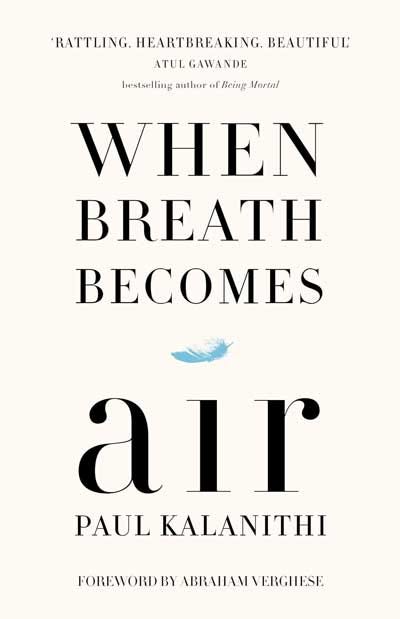When Breath Becomes Air is Paul Kalanithi's memoir written as he faced a terminal cancer diagnosis at age 36, just as he was completing his neurosurgical residency at Stanford. In it, he examines his journey from doctor to patient, grappling with questions of what makes life meaningful in the face of death. His wife Lucy completed the book after his death in 2015, providing an epilogue about his final days.
Kalanithi brings both his scientific knowledge as a doctor and his love of literature as a writer to bear on the ultimate question we all face: how to live well even when we know we are dying?
Here are four pieces of advice from the book:
Don't let statistics define your choices
“I began to realize that coming in such close contact with my own mortality had changed both nothing and everything. Before my cancer was diagnosed, I knew that someday I would die, but I didn’t know when. After the diagnosis, I knew that someday I would die, but I didn’t know when. But now I knew it acutely. The problem wasn’t really a scientific one. The fact of death is unsettling. Yet there is no other way to live.”
On living in the present when the future is uncertain
"The way forward would seem obvious, if only I knew how many months or years I had left. Tell me three months, I'd spend time with family. Tell me one year, I'd write a book. Give me ten years, I'd get back to treating diseases. The truth that you live one day at a time didn't help: What was I supposed to do with that day?"
Make time count by staying true to your values
"You can't ever reach perfection, but you can believe in an asymptote toward which you are ceaselessly striving... The main message is that mercy trumps justice every time."
On science versus meaning
“We build scientific theories to organize and manipulate the world, to reduce phenomena into manageable units. Science is based on reproducibility and manufactured objectivity. As strong as that makes its ability to generate claims about matter and energy, it also makes scientific knowledge inapplicable to the existential, visceral nature of human life, which is unique and subjective and unpredictable. Science may provide the most useful way to organize empirical, reproducible data, but its power to do so is predicated on its inability to grasp the most central aspects of human life: hope, fear, love, hate, beauty, envy, honor, weakness, striving, suffering, virtue.”
Book Freak Paid Subscribers Get Full Access to Past Issues!
It’s just $5 a month or $45 a year. Click the upgrade button to find out more.
Buy a Book Freak Unclassified ad for just $50 and reach over 14,300 readers!
Elkkorr Hauxx was happily exploring the universe when a wayward meteor irreparably damaged his spaceship, forcing him to make an emergency landing on a primitive world. Find out what happened to Elkkorr in The Lost Explorer. "Great story and a lovely little twist."
Brain food, delivered daily. Every day we analyze thousands of articles and send you only the best, tailored to your interests. Loved by 521,781 curious minds.
I use a fantastic app called Reader, the first read-it-later / newsletter / RSS-reading / web-highlighting app for power readers. Save everything to one place, highlight like a pro, and replace several apps with Reader. Book Freak readers can try it free for 60 days.
Setapp is a hand-picked collection of quality software, packed with prime apps. There’s no store — just a folder on the Mac, and no hidden costs — just a flat monthly fee. It’s simple, and users love it. Try it here!
Book Freak is published by Cool Tools Lab, a small company of three people. We run the Cool Tools website, a video reviews YouTube channel, and other newsletters, including Gar’s Tips & Tools, What’s in my NOW?, and Recomendo. You can also support our work by becoming a patron via Patreon.



